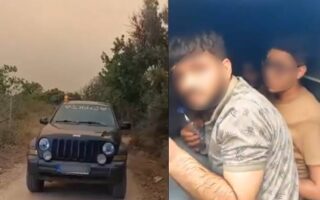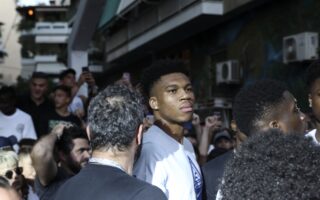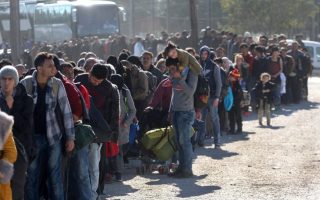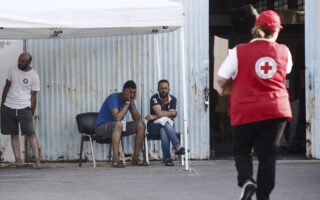Creating a place for all of us
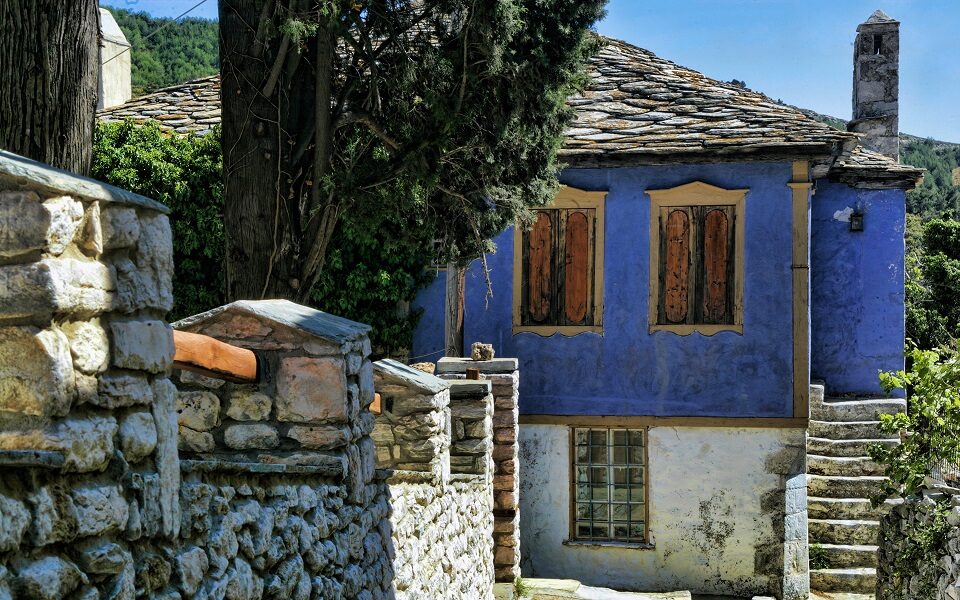
I am always very touched and humbled to stroll through the Greek mountain village of my grandfather where he lived and played as a boy with his family. This summer in Agios Petros, Lefkada, in the Ionian chain of islands, my spirit about this ritual never diminished, I passed a humble house on my way to the “plateia.” An old woman came to the open door dressed in a traditional dark long dress, long sleeves, her head covered, which is an attire disappearing from these places. The places, the villages themselves, are also disappearing over time. She must be one of the last to dress this way.
Her tanned, weather-worn face broke into a toothy smile. “Kalimera,” she said. Good morning, I greeted her back in kind. “Who are you?” she followed with. I am the granddaughter of Dan Drakontaithis, I said. “Ah! I knew him. You are the cousin, then, of Yianna Vlassopoulou.” Yes, I am. “Please,” she said, “Come in for coffee.”
I couldn’t stop for coffee because we were on our way to the beach for our daily or twice-daily “banio,” a swim. I thanked her just the same and recounted the sweet story to my cousin, Yianna, when I returned to the house. She said this is the way it should be and the way it used to be. Welcoming the stranger is what we are known for, aren’t we? She recounted a beautiful story about Klaus. From Germany.
The decade was the 1960s. Yianna was around 10 years old. The village then had recently come into electricity and running water. It was remote, the nearest “town” being the tiny, sleepy fishing village of Vasiliki, 6 kilometers away.
Klaus, a child of the 60s and all that it entailed, was backpacking through Greece and made his way, serendipitously, to Lefkada. Up the steep mountain road came the plodding Klaus, weaving a bit from the weight on his back. He was like a village donkey, a thick, long backpack, with a rolled sleeping bag strapped to the bottom, was wrapped around his shoulders and around his waist.
Klaus was an oddity. A phenomenon. A “xenos.” A stranger who did not look like any of the villagers. And rarely did anyone find their way, let alone on foot, to sleepy Agios Petros, but the villagers in and around the village themselves.
The village men outside of the “kafeneion,” legs crossed, “koboloi” in one hand, cigarettes in the other, watched quietly as Klaus made his way toward them. Not suspicious were they. But curious. What was this man doing so far from wherever was home?
The children gathered in the road to watch Klaus walk through. Yianna thought to herself that he looked like Jesus Christ himself had come to pay them a visit. Klaus was tall and thin. Fit. Long wavy brown hair, translucent blue eyes, scruffy beard, grungy clothing and worn shoes, as you’d expect. No palm frond in his hand, though. Just an ordinary young man. Free. Not a care in the world, and wandering his way through Greece.
Yianna’s father came to the door of his kafeneion, hands on his hips, a towel slung over a shoulder. He threw his arms wide open and said, “Kalos orisate!” Welcome. They had little in common, they looked strange to each other, but Theo Elias beckoned him inside, gave him an ouzo and also immediately something to eat. “Where are you from?” he asked. “Deutschland,” Klaus answered. Deutschland. They did have something in common.
Theo Elias spent four years in Germany and could speak the language. The day pressed on. Villagers came and went to meet Klaus. To sit with Klaus. To eat with Klaus. To learn about Klaus. Later that night, Klaus was offered a place to sleep in the kafeneion after it closed and a place to wash. My uncle put newspapers on the floor on top of which Klaus could unfurl his bedding.
This was the Greek way. To welcome the stranger, an odd juxtaposition of two words merged into one. Philoxenia. Friend. Stranger. To welcome the stranger.
Klaus stayed for several weeks and all the villagers each day jockeyed to house and feed him. He became part of their world. He even went with my uncle down to the “kabo,” to the fields, to help him work, with the animals, the vegetables, with the olive trees. Klaus wanted to repay his host for his kindness.
Klaus eventually continued on his journey to places yet unknown. The village had been enlivened and enriched by his presence and they changed his life as well. That Christmas after Klaus had long since gone, my uncle received a small package in the mail.
“Thank you, be well always, God bless you,” the card said. And wrapped in a piece of cloth was a small crucifix carved from olive wood. A small, but meaningful token of gratitude and love. From Klaus.
This is a long way to express the hope that one day Greece and other nations of the world can welcome the stranger who comes to their towns and villages. Some today are mere happy wanderers, like Klaus. But many others, and in greater numbers, are refugees and immigrants seeking a new, better life in a small but great country that was once traversed by people of many faiths and colors, selling their wares, passing through, studying, learning Greek, experiencing rapturous religious odysseys.
I have an idea, something we should or maybe could consider. A proposal. And it will take time and dedication to a meaningful cause, plus an enormous amount of energy and organization led by an inspired public servant and a team to see it successfully through. This proposal was inspired and stems from some time I spent in the north of the country in a region called Dorida.
There is a collection of around 13 villages there, all beautiful, all tucked away on mountain slopes with amazing vistas, valleys, and land all around with ample water. Fresh, clean mountain water flows through all the “vrisia,” the public fountains, but there are few to partake because most of them are nearly deserted. It is a heartache.
This was the Greek way. To welcome the stranger, an odd juxtaposition of two words merged into one. Philoxenia. Friend. Stranger. To welcome the stranger
I stayed in Koupaki. Population, five. Alpochori, population two, comprises one taverna owner and his sister, a shepherdess. Takis, the taverna owner, holds all the keys to all the houses and businesses that once were there. Just in case? In case someone comes to visit? In case someone wants to see? Purchase?
These villages are not aberrations. The conditions of many remote villages across Greece, especially in the Peloponnese and in the north of the country, are common. Older people die. Younger people can’t make a living there. The vrisia often run dry. Homes and plateias are left to atrophy and decay. Emptied. Lonely. A waste.
Why not resettle these villages. Why not offer these homes and land to refugees and immigrants? Not without condition, but engage them as participants in a country they are not yet fully part of? We would develop a fair and equitable system, do it in order to successfully assimilate people who simply want to have peace, make a living, and contribute to the place where they call home. They have to have some skill. Carpenters, farmers, doctors, teachers. People who can raise animals and crops. People who do roofing and plumbing. People who can open stores. Develop more vineyards and train vintners and viticulturists in the country. Develop a skilled labor force to build back these beautiful places, to revitalize them with life and work and love and music.
People would be expected to learn Greek and to do business in Greek. We could create a lend-lease/option-to-buy program. Families would be given homes and land to improve and on which to make a living. As they become established, they begin to rent the property from the government or from whomever owns it. In more time, families are given the option to buy the property and to pay taxes as would any other resident of the country and municipality in which the village sits.
People who aspire and dream to own their own land and those who give them the opportunity to do so create citizens who, with their whole hearts, love the country that gave them the chance to build again, to start over in a place that is peaceful and kind. And what is wrong if some of our villages are dotted with crucifixes from Greek Orthodox churches, the minaret of a mosque, a star of David on a synagogue? What is wrong if wafting through the night mountain air we hear rebetika from one corner and klezmer music from another? What if some dance the dabke and others the tsamiko?
Nothing.
I am reminded of the founder of the yogurt company, Chobani, Hamdi Ulukaya. He came to America an immigrant in 1994 from a place that most people could probably not find on a map. He is from the Kurdish region of Turkey, in the eastern part of the country. He came from a family who were nomads and raised sheep and goats to make cheese and yogurt. In a world of Smiths and Joneses and Johnsons, a guy called Hamdi Ulukaya settled in upstate New York. He made cheese like his family before him. Nearby, he saw that there was a yogurt factory for sale that was decades old. The story is legendary now. He managed to buy it with the help of a special loan program and he started by hiring four people. It was wildly successful and so he opened another factory in Idaho. Today Chobani is a multimillion-dollar company employing some 2,000 people. This accomplished by an immigrant from a faraway land. But Hamdi Ulukaya is as American as me and he was successful because someone gave him a chance to succeed and to give back.
Philotimo. It is what is in our Greek DNA, which we must practice in the here and now as we are approaching an even bigger refugee crisis, one born from our baking, broiling, boiling planet. Millions will be on the move as climate refugees and every country in the world should have a plan. No country can help everyone who comes to its shores. There must be quotas and standards. And rules. Order, not chaos.
I have believed since I’ve been coming back and forth to Greece, and now having moved here, that Greece can be a beacon and model for others. I disregard the eye-rollers because I believe in this country. I have faith and hope in it. First, we need people who can explain to the people how this will work, how it makes the country stronger, not weaker, better, not worse, more prosperous, not diminished. And we need young, progressive thinkers and politicians who have vision beyond their own cushy jobs and whose first interest, whose best interest is the people, the people they serve.
How about a grand plan developed by Greeks for Greece?
As we resettle and assimilate our skilled labor force of immigrants and refugees, why not also create a completely sustainable Greece in the meantime? On these deserted, decaying properties, we grow all our own food, we raise our animals, we grow more vines which are resilient and resistant to fires, plant more fruit trees, we foster soil regeneration, build small plants that make things, manage waste and the consumption of water. In Greece, we fulfill what the United Nations has said about sustainability, which is to “harmonize” these three elements: economic growth, social inclusion and environmental protection. We have the ability to do all three. But do we have the will? Politically? Societally?
There is no question that this plan cannot be at the expense of the Greeks who have suffered through an economic crisis and Covid. Wages and pensions were diminished. Those need to be restored a little at a time. The government owes its people that. This plan for the immigrants and refugees needs to float all boats to prosperity. Can you imagine if we tried? If we all pulled together and it worked? “Makari.” I wish. “Elpizo.” I’ll hope, too.
I write as the Athens Democracy Forum is set to open its 11th conference this week in Athens. It is an important conference that presents world problems and offers solutions to ones exactly like these. And the conference dedicates time and space, and a lot of it, to young, smart voices who have dreams and aspirations and who have brilliant plans for actuating ideas. We must listen and heed. The time for talk alone has long since passed. We need to do something to make things better and we can’t just watch. And argue. We each have roles to play in a country that we will either make or break.
Sometimes engaged, active citizenship takes courage. And change is difficult and can take time. Understanding comes slowly. But as Martin Luther King, Jr once wrote: “We must live together as brothers or perish as fools.”
This is the choice before us now.
Dr Mary Cardaras, writer, journalist and documentary filmmaker, holds a PhD in Public and International Affairs from Northeastern University in Boston. She is the founder and director of The Demos Center at The American College of Greece. She was born in Greece and was one of the 4,000 so-called Lost Children of Greece, who were exported from Greece to adoption. She is an activist fighting for open adoption records and the restoration of Greek citizenship for all Greek-born adoptees.
